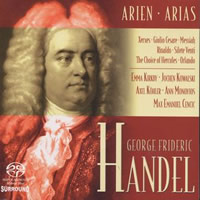Handel Arias
|

Capriccio 71 024
1 SACD Hybrid
full price
Compilation of extracts
Released in 2005. |
- "Or la tromba" (from Rinaldo)
- "He shall feed his flock" (from Messiah)
- "Turn thee, youth, to joy and love" (from The
Choice of Hercules)
- "Fammi combattere" (from Orlando)
- "Dulcis amor" (from Silete venti)
- "Rejoice greatly" (from Messiah)
- "Sußee Stille" (from Nine German Arias)
- "Vivi tiranno" (from Rodelinda)
- "This manly youth’s exalted mind" (from The Choice
of Hercules)
- "Va tacito" (from Giulio Cesare)
- "Ombra mai fu" (from Serse)
- "Why do the Nations" (from Messiah)
- "Amor, nel mio penar" (from Flavio)
- "Mount, mount the steep ascent" (from The Choice
of Hercules)
Ann Monoyios, Emma Kirkby, Arleen Auger, Max Emmanuel
Cencic (sopranos); Axel Köhler, Charles Humphries, Jochen Kowalski
(altos); Kammerorchester CPE, Academy of London,
Neues Bachisches Collegium Musicum Leipzig, Berliner Barock-Compagney,
Händelfestspielorchester des Opernhauses Halle, Hartmut Haenchen
(conductor), Max Pommer (conductor), Howard Arman (conductor), Peter
Marschik (conductor) |
Capriccio has an impressive
discography of baroque music, especially Telemann and Bach performed by Hermann
Max and Das Kleine Konzert, and enterprising one-offs such as Hasse’s
Cleofide (the same Metastasio libretto as Handel’s Poro) conducted by
William Christie. Alas, this compilation made for SACD reveals that the label
has rarely scaled comparable heights in Handel repertoire.
For many years, Max Pommer’s The
Choice of Hercules was the only version available on CD: it is by no means
an unattractive performance, but does not justify the importance given to it
here (although one can never complain about having to listen to Arleen Auger,
who sings in two of the three extracts included here). Axel Köhler’s Handel
opera aria recital conducted by Howard Arman is probably his finest Handelian
hour, although ‘Fammi combattere’ is not one of the best arias from it, despite
its inclusion here. Köhler’s ‘Va tacito’ is much better, but much of the
interest of this disc is in Arman’s expert direction: it is a pity that this
under-rated British conductor based in Germany and Austria has not made more
recordings, despite his regular appearances over the years at the Halle
festival.
Emma Kirkby’s Capriccio recording of
Silete venti with Cappella Coloniensis has been difficult to obtain for
some years. The tantalising inclusion of ‘Dulcis amor’ is disappointing, with
Hans-Martin Linde’s direction sounding mechanical and unpersuasive, and Kirkby
sounding downright detached and disinterested. Her fans might be disappointed on
this evidence, but the entire recording has also been reissued by Capriccio as
part of a boxed set celebrating the career of Cappella Coloniensis: the rest of
the performance is happily more convincing than the extract chosen here, though
only devoted admirers need go out of their way to hear it in preference to
recordings by Sylvia McNair, Karina Gauvin, and Lynne Dawson.
Max Emanuel Cencic is beginning to
create quite a stir in the baroque opera world, with his soprano register
sounding much more assured and pleasing than most would-be castrati that made
such attempts during the 1990s. His performance of some arias from Capriccio’s
recording of Messiah (featuring the Vienna Boys Choir) must be one of his
earliest recordings. It does not compare favourably with his more recent work,
such as the excellent performance of the pasticcio Andromeda Liberata
(with the Venice Baroque Orchestra, on DG Archiv). The pedestrian and rather
old-fashioned orchestral performances are also evident in Jochen Kowalski’s
renditions of ‘Or la tromba’ and ‘Vivi tiranno’ with the CPE Bach Chamber
Orchestra. Neither performance comes to life.
In fact, the only truly first-rate
performance is Ann Monoyios’ ‘Suße Stille’ from her beautiful recording of
Handel’s Nine German Arias. This is a much fairer testament to the quality of
Capriccio’s best work, but this version of the sublime 9 German Arias is worth
acquiring in its own right. Likewise, if you are curious about the performances
by Arleen Auger or Axel Köhler it would be better to find the original discs
rather than invest in this strangely arbitrary and uneven compilation.

© David Vickers - March 2005
Return to the G. F. Handel Home Page

